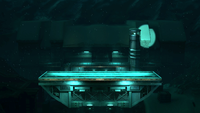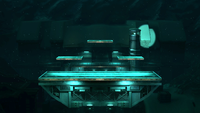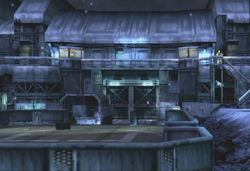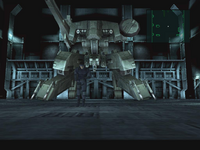Shadow Moses Island
| Metal Gear Solid Shadow Moses Island | |
|---|---|
{{{content1}}}
{{{content2}}}  Shadow Moses Island as it appears in Smash. | |
| Universe | Metal Gear |
| Appears in | Brawl Ultimate |
| Availability | Starter |
| Crate type | Futuristic (Brawl) Normal (Ultimate) |
| Maximum players | 4 (Brawl) 8 (Ultimate) |
Shadow Moses Island (シャドーモセス島, Shadow Moses Island) is a Metal Gear series stage in Super Smash Bros. Brawl and Super Smash Bros. Ultimate. It was officially recognized in the October 2, 2007 Smash Bros. DOJO!! update, having appeared before that in many trailers and screenshots. The stage was developed by Hideo Kojima.[1][2]
Playing 15 matches on this stage is one of three ways to unlock Snake in Brawl. In both Brawl and Ultimate, Snake is also fought here for his unlocking battle.
Stage overview
The stage consists of two floors: the ground floor, which is completely solid, and the upper floor, which is soft. There are watchtowers on each side, acting as vertical walls which prevent horizontal KOs. Each watchtower also has a soft platform attached to it, the height of which is halfway between the lower and upper floors, assisting in navigation between the floors.
The watchtowers act as attackable walls, and each one has a lower and upper section. The upper section can take up to 54% (Brawl) or 80% (Ultimate) damage before being destroyed, while the lower section can take up to 66% (Brawl) or 100% (Ultimate) damage. If the bottom section of a tower is destroyed, the upper section is destroyed along with it. With the destruction of the towers, the sides of the stage are exposed, and horizontal KOs become possible.
A completely destroyed watchtower will be rebuilt two minutes after its bottom section's destruction; destroying only the top section does not trigger any rebuilding. When the tower rebuilds, all edge-bound fighters are pushed back into the center. However, though generally unknown, most characters can get over the towers by jumping multiple times as a watchtower is resurrected. The walls can also be bypassed by using a Warp Star near the sides and tilting past them. The characters will remain trapped (and largely unreachable) until the towers are destroyed again.
Occasionally, a spotlight will appear, shining onto the stage from the front, which moves around. If a fighter is spotted by the light, a "!" will appear over their head and the "discovery" sound effect from the Metal Gear games will play. The light will continue to follow the fighter for a while. The light has no effect on gameplay, being only an aesthetic element.
A random Metal Gear will occasionally burst through the roof in the background: Metal Gear REX, Metal Gear RAY, or two Gekkos. In Brawl, only one of these can appear per match, determined randomly when the stage is loaded. In Ultimate, the roof will repair itself after a while, allowing it to be broken through by another Metal Gear later in the match. The Metal Gears have no effect on gameplay.
Snowfall is present as an aesthetic element on this stage. The amount of snowfall is randomly determined for each match, out of four possible levels: medium (40% chance), light (30%), heavy (20%) and none (10%).
The exterior of this stage, which is not viewable in-game by normal means in Brawl, but it can be seen in this video on the Smash Bros. DOJO!! site. In Ultimate, however, the exterior can be seen in the Battlefield and Ω forms.
Smash Taunt
Snake can trigger his Smash Taunt on this stage by pressing the down taunt input for one frame. The Smash Taunt involves conversations via codec between Snake and one of his teammates (Colonel Campbell, Otacon or Mei Ling) about a randomly chosen opponent. Additionally, for Falco's conversation, Slippy is Snake's conversation partner instead.
Like other Smash Taunts, Snake's Smash Taunt can only be performed once per match, even if it is interrupted. If the Snake player who initiated the Smash Taunt is KO'd during the conversation, the conversation partner will shout "SNAAAAAKE!", referencing Game Overs in the Metal Gear series, and the conversation will end.
In Ultimate, the Smash Taunt can only be triggered for characters that were present in Brawl, as all of the conversations are reused. If Snake's only opponents are characters that were not in Brawl, the Smash Taunt cannot be performed. This leads to some misinformation, such as Mei Ling referring to Alph as Olimar or Otacon referring to Sonic as being “here in Brawl”.
Ω form and Battlefield form
In Super Smash Bros. Ultimate, the design of the main platform of the Ω form and Battlefield form is reminiscent of the tank hangar, such as the floor resembling the driveway in front of the door and the walls resembling the facade of the building. The platform is also the same size and shape as Final Destination and Battlefield, respectively. The tank hangar and the surrounding area are in the background, and the searchlights and Metal Gears still appear occasionally. The design of the three soft platforms of the Battlefield form resemble the soft platforms of the regular form.
Origin
This stage is based on the first area of Shadow Moses Island in Metal Gear Solid: a helipad located outside a tank hangar and connected to a nuclear weapons disposal facility. Its design in Smash is slightly different than the original game: the staircases are missing, the truck that was parked in front of the building is gone, and the height of the searchlight towers have been extended. In Metal Gear Solid, the facility's searchlights are focused on the helipad itself. If Snake is caught by the light, his cover is blown and guards are called to kill him. The searchlights remain focused on him until he finds somewhere to hide. Ever since Metal Gear Solid, if the player is seen by security, the trademark exclamation point is displayed over the enemy's head, and the corresponding sound effect plays. If a player gets caught by the searchlights in Smash, an exclamation point will appear over the player who got caught, and the same sound can be heard. The searchlights will also follow that player for a short time.
In Metal Gear Solid, Snake was first commissioned out of retirement to infiltrate the facility to destroy a nuclear capable mech, Metal Gear REX, before Liquid Snake could launch its nuke. In Metal Gear Solid 2: Sons of Liberty, the U.S. Marine Corps designed a new Metal Gear called Metal Gear RAY. It was designed as a counter to the immense amount of Metal Gear REX derivatives being constructed around the world. Both REX and RAY have a chance of appearing in the background of this stage; however, RAY never appeared on Shadow Moses Island until Metal Gear Solid 4: Guns of the Patriots, where Snake and Liquid Ocelot fight each other using REX and RAY.
In Metal Gear Solid 4: Guns of the Patriots, there is a class of mass-produced mechs called Gekkos. Unlike REX and RAY, Gekkos aren't able to launch nukes, so Gekkos aren't true Metal Gears. In Guns of the Patriots, Gekkos appear on Shadow Moses Island. The design of the Gekkos resembles their appearance in Guns of the Patriots; however, Super Smash Bros. Brawl was first released on January 31, 2008 in Japan, while Metal Gear Solid 4 was released internationally on June 12, 2008, making Brawl the first game that Gekkos appear in.
Tournament legality
Shadow Moses Island is banned in tournaments because of aspects considered detrimental to competitive play. The difficulty of KOing horizontally means that players have to resort to vertical KOs, granting an unfair advantage to characters with powerful vertical KO moves. The non-presence of the bottom blast line renders edgeguarding and similar techniques virtually useless. Finally, in Brawl, the watchtowers allow for abuse of chaingrabs performed up against them, most notably King Dedede's chaingrab - against any character with a weight of more than 87 (Marth's weight), he can infinitely chaingrab them against the wall and finish with an unavoidable up tilt for a KO.
Gallery
Super Smash Bros. Brawl
Super Smash Bros. Ultimate
Little Mac using Jolt Haymaker on the stage.
Zero Suit Samus crawling with Snake on this stage.
Names in other languages
Trivia
- In Brawl, if Jigglypuff uses all of its midair jumps and uses Rest where a wall was, once the wall regenerates Jigglypuff will be inside it and able to go offscreen to the side without getting KOed.
- In Brawl, if a character is standing right next to one of the watchtowers and a Landmaster rams them, they will be forced through. This is possible from both the top platform and below the starting platforms.
- When the Poison Cloud hazard is active during the Liquid Snake Spirit Battle, the back wall is actually removed. This can be seen during the wall breaking sequence by the fact the particle effects can be seen through the lower level which normally cannot be seen, and additionally when they get close enough to the stage, the entire body of the Gekkos can be seen, even parts that should be obscured behind the wall. This is likely done so the thick fog effect for the background isn't blocked by the wall.
- In Ultimate, the shadows on this stage dynamically change; normally, they face toward the camera, but when the spotlight is active, they shift away from the camera to allow for silhouettes to appear on the back wall.
- When playing either on the Battlefield or Ω form of this stage, when navigating the camera to the back mountains, a black void is exposed. This is most noticeable when playing on this stage in an Angled Special Smash.
- Additionally, another black void can be seen when navigating the camera down at the street.
- In Ultimate, the following Assist Trophies cannot normally appear on this stage: the Moon, Andross (due to being completely obscured by the background), Kapp'n, Devil, Nikki (due to the dark background obscuring her drawings) and the Squid Sisters. Additionally, Abra and Lunala cannot be summoned on this stage. Despite this, the Moon appears on this stage's Battlefield form during the Radiant Gleam spirit battle.
- Only one watchtower is present in this stage's Battlefield and Ω forms.
References
External links
|
| |
|---|---|
| Fighter | Snake (SSBB · SSBU) |
| Assist Trophy | Gray Fox |
| Stage | Shadow Moses Island |
| Item | Cardboard box |
| Other | Colonel Roy Campbell · Mei Ling · Otacon |
| Trophies, Stickers and Spirits | Trophies · Stickers · Spirits |
| Music | Brawl · Ultimate |
















